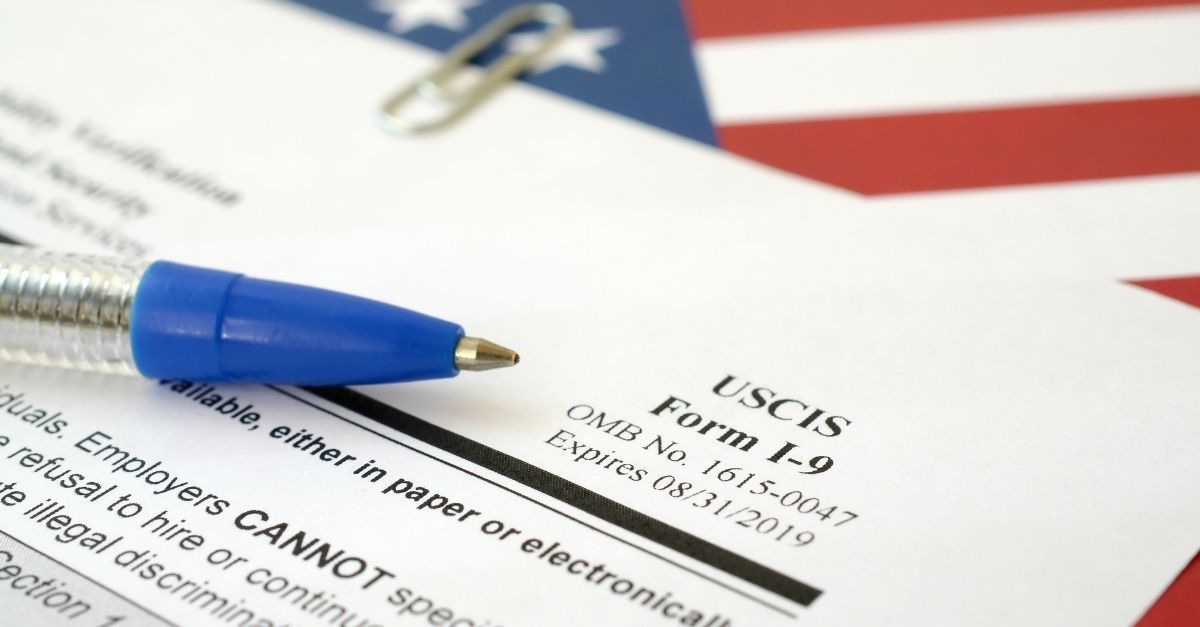DHS and DOJ Issue Guidance for Employers Using Electronic I-9 Programs
February 13, 2024
By: Daniel Brown
On December 20, 2023, U.S. Immigration and Customs Enforcement (ICE) and the Immigrant and Employee Rights Section within the Civil Rights Division of the Department of Justice (IER) issued a joint fact sheet for employers using I-9 software programs to complete I-9 forms and access the E-Verify program.
The fact sheet is intended to help employers avoid committing I-9 violations or immigration-related discrimination when they utilize commercially available or proprietary electronic I-9 software programs to complete and retain I-9 forms and access the E-Verify program.
Employers are Responsible for the Compliance of their Electronic I-9 Systems
ICE first issued regulations in June 2006 authorizing employers to electronically complete, sign and retain I-9 forms. Those regulations contain a number of system standards and requirements as well as several provisions identifying specific system failures that will constitute I-9 violations.
When conducting I-9 audits, ICE has increasingly been focused on the underlying compliance of any electronic I-9 system the employer is using. We are aware of several cases where ICE has imposed penalties on employers because of compliance failures of the I-9 system being used.
On page one, the fact sheet makes clear that the responsibility for compliance with ICE regulatory requirements rests with the employer and not the program vendor:
“Using a Form I-9 software program does not guarantee an employer’s compliance with federal law. Employers are responsible for ensuring that any Form I-9 software program used to electronically complete, modify, or retain the Form I-9 or participate in E-Verify complies with all legal requirements.”
It is important that employers don’t simply rely on the fact that an I-9 system is commercially available, but rather that they ensure any prospective I-9 system is compliant with the ICE regulations.
Guidance Regarding Electronic I-9 Systems
Before this fact sheet, the government had issued very little guidance to the public regarding the regulatory requirements for electronic I-9 systems. Unfortunately, the guidance provided in the fact sheet is not comprehensive and it fails to sufficiently address some of the primary compliance requirements within the ICE regulations. The government has still failed to provide employers with practical and useful guidance to enable a review of third-party vendor systems and to conduct sufficient due diligence on their I-9 systems.
It is also important to note that the fact sheet is a joint product of two different federal agencies with substantially different enforcement interests. Despite these concerns, the fact sheet does provide some insight into the government’s views on certain aspects of the ICE regulatory requirements.
The following are some of the key points from the fact sheet that employers need to be aware of when assessing potential I-9 systems, along with our comments in certain cases:
- Employees and employers must be allowed to leave optional and unused fields blank when appropriate, such as the Social Security number in section 1 for employers not using E-Verify, and the expiration date field in section 1 next to the “A noncitizen authorized to work” attestation.
-
- Comment: The I-9 instructions before the current I-9 form version instructed employers not to leave fields blank but to enter “N/A” instead. This may require I-9 systems to reprogram certain rules for fields where information is not required.
-
- Employers must be able to enter any acceptable documentation including receipts, that employees choose to present at either the time of hire or during a re-verification.
- The I-9 system must comply with the requirements found in the ICE electronic I-9 system regulations, relating to the integrity, accuracy and reliability of the system; security and documentation; indexing; electronic signatures; retention; audit trails; location, retrieval, reading and reproduction abilities; as well as the ability to provide Form I-9 summary files (such as a spreadsheet) containing all the information fields on electronically stored I-9 forms requested by the government during an I-9 audit.
-
- Comment: In our view, the government should provide much more comprehensive guidance on these requirements so that employers can better understand what is legally required in practice.
-
- The system must allow employees, employers and preparers/translators to make and record corrections to the information entered on the I-9 form.
-
- Comment: There are several commercially available I-9 systems that fail to comply with this guidance and lack the functionality to allow corrections of completed I-9 records. In many cases, these systems would instead require the completion of an entirely new I-9 to fix errors.
-
- The Form I-9 software program must uniquely identify each person accessing, correcting, or changing an I-9 form.
-
- Comment: This is one of the more important requirements within the ICE electronic I-9 regulations. We have seen ICE penalize employers where the government alleges that an I-9 system’s audit trails do not meet this guideline. Unfortunately, the government has failed to provide specific, practical guidance to the public on how to ensure compliance with this requirement.
-
- Any I-9 system must not automatically pre-populate the I-9 with employee information that the employer has accessed externally, such as from an employee’s job application.
-
- Comment: The government has repeatedly expressed concerns with the pre-population of employee information in section 1 of the I-9 form. Many popular I-9 systems are components of other HRIS systems and are designed to initiate the I-9 form through pre-population of the newly hired employee’s information. Employers should carefully assess whether they want to take on the risk of pre-population given the repeated guidance from the government on this issue.
-
- Any I-9 system must not remove any Form I-9 fields, or request more or different information than the I-9 requires.
-
- Comment: Many I-9 systems may violate this guidance by adding additional questions seeking information that is not requested by the I-9 form.
-
- Any I-9 system must not use auto-correct, use predictive text or post-date a Form I-9.
-
- Comment: It would be helpful if the government would provide more detail about what aspects of using auto-correct or predictive text cause concerns. It is not clear what the legal basis is for this prohibition provided in the fact sheet.
-
- Any I-9 system must not fail to document any changes made to a form I-9 in an audit trail.
-
- Comment: The audit trail requirement is one of the critical regulatory requirements that an I-9 system must comply with. It is important that the I-9 system’s audit trails sufficiently record all of the actions taken on each I-9 record and what individual performed those actions. Many commercially available systems may not meet this requirement.
-
- Employers must not change or update an employee’s citizenship or immigration status attestation. The employee must be the one to make changes or corrections to section 1 information.
-
- Comment: This is no different from completing an I-9 on paper. The employee must be the one to make any changes or corrections to section 1 information. An I-9 system needs to have the functionality to allow the employee to do this after an I-9 is completed.
-
- An I-9 system must not request unnecessary documentation (such as reverifying an employee’s identity or impermissibly reverifying an employee’s permission to work).
-
- Comment: An I-9 system should not send notifications that an employee must reverify or provide additional documentation due to the expiration of a List B document or permanent resident card.
-
- An I-9 system must not create new E-Verify cases after making corrections to the I-9 form if the employee already received an employment-authorized result.
-
- Comment: This can often occur where a system requires the completion of an entirely new I-9 form to correct an error, rather than allowing a correction of the specific information on the existing form.
-
- Employers should be cautious of any system claiming government endorsement, certification or approval. DHS does not certify or endorse any I-9 software programs in any way.
- I-9 systems should not impose unnecessary obstacles that make it harder for employees to start work or get paid, such as when they are waiting to receive a social security number.
Due Diligence and Compliance
Employers should exercise appropriate due diligence when reviewing their existing or prospective electronic I-9 systems.
Compliance with the specific ICE regulatory requirements needs to be incorporated into that due diligence along with other factors such as cost, functionality and interoperability with other systems.
Need to Know More?
For further information and assistance with questions regarding I-9 system requirements and I-9 compliance in general, please contact, Partner Daniel Brown at [email protected].
This blog was published on February 13, 2024, and due to the circumstances, there are frequent changes. To keep up to date with all the latest updates on global immigration, please subscribe to our alerts and follow us on LinkedIn, X, Facebook and Instagram.















